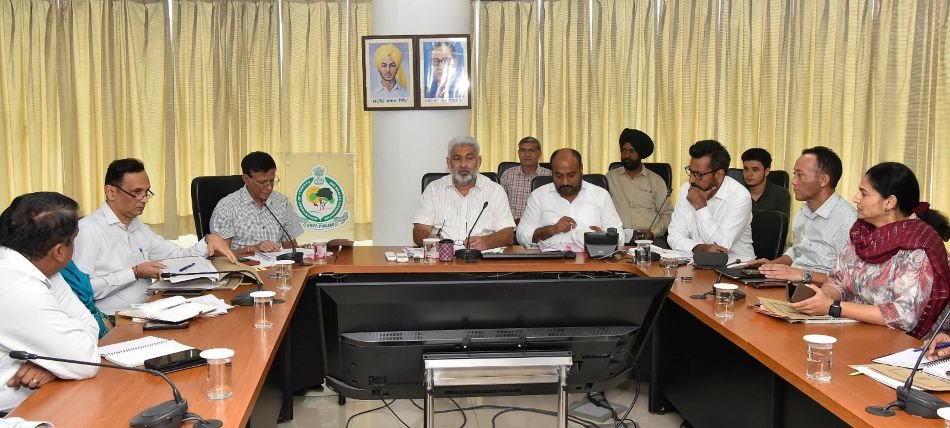Punjab Drafts ‘Protection of Trees Act 2025’ to Safeguard Green Cover and Promote Ecological Balance
Punjab drafts Protection of Trees Act 2025 to safeguard green cover, ensure ecological balance, and prevent pollution; 90 lakh saplings planted against 80.5 lakh target; dead and dangerous trees being felled for safety.
The Forest and Wildlife Preservation Department of Punjab is in the process of drafting The Punjab Protection of Trees Act, 2025 with the core objective of preserving the state’s green cover, ensuring ecological balance, preventing environmental pollution, and conserving soil resources. The Act is proposed to extend across all urban areas of Punjab, including Nagar Councils, Municipal Corporations, Notified Area Committees, Town Area Committees, and urban development authorities or bodies. A key provision under the Act includes the appointment of a “Tree Officer,” defined as an Executive Officer in urban local bodies or any other officer designated by the State Government. As outlined in Section 4 of the draft, no individual shall fell, cut, remove, or dispose of any standing tree within urban areas, except in cases where the tree is completely dead or has fallen naturally without human intervention. Section 5 specifies exceptional circumstances where felling may be permitted, while Section 9 prescribes penalties for unauthorized removal or felling of trees in contravention of the rules.
Chairing a high-level meeting with senior officials of the Forest and Wildlife Preservation Department at the Forest Complex, Punjab’s Minister Incharge, Lal Chand Kataruchak, was informed that the department is presently undertaking a phased program to remove dried, dead, and dangerous trees that pose threats to human life. In the initial phase, approximately 25,000 such trees are being felled to ensure public safety. The Minister expressed appreciation for the department’s achievements, particularly in surpassing the ambitious plantation target set in connection with the 350th Martyrdom Day of Sri Guru Tegh Bahadur Sahib Ji. Against the original target of planting 80.5 lakh saplings across 23 districts of Punjab, the department has successfully planted 90 lakh saplings, averaging around 3.50 lakh per district.
Reviewing plantation drives along major highways, Minister Lal Chand Kataruchak highlighted progress in districts including Ropar, with special emphasis on Sri Anandpur Sahib, Shaheed Bhagat Singh Nagar with focused plantation around Khatkar Kalan—the ancestral village of Shaheed Bhagat Singh—along with Sangrur, Pathankot, and Amritsar. During a video conference with Divisional Forest Officers (DFOs), the Minister lauded Sangrur district for taking the lead and called upon all departments to pursue the initiative with full dedication and zeal to expand Punjab’s green footprint.
In addition to reviewing ecological initiatives, the Minister also gave approval for reclassification in categories for poetry competitions organized in commemoration of the late Punjabi poet Shiv Kumar Batalvi. The updated categories now include Primary (Classes 1st to 5th), Secondary (Classes 6th to 8th), and Senior Secondary (Classes 9th to 12th), aimed at promoting wider participation among school students and preserving Punjab’s rich literary culture.
The meeting witnessed the participation of key officials, including Rakesh Puri, Chairman of the Punjab State Forest Development Corporation; Dharminder Sharma, Principal Chief Conservator of Forests (Head of Forest Force); Praveen Kumar, Managing Director of Punjab State Forest Development Corporation; Saurav Gupta, APCCF-cum-CEO PUNCAMPA; Basanta Raj Kumar, APCCF (Administration); Nidhi Srivastava, Chief Conservator of Forests (Hills); and Sagar Setia, Chief Conservator of Forests (Wildlife).
By framing the Punjab Protection of Trees Act, 2025, and executing large-scale plantation drives, the state is aligning itself with both national and international commitments to fight climate change, enhance carbon sequestration, and safeguard biodiversity. Environmentalists emphasize that such initiatives also hold global relevance, as urban greenery plays a crucial role in reducing the impact of global warming, combating urban heat island effects, and improving air quality. Punjab’s push for plantation and tree protection is also expected to resonate with international audiences interested in sustainable development, climate resilience, and conservation practices.
The Forest and Wildlife Preservation Department’s efforts highlight how Indian states are addressing the urgent need for ecological preservation by creating legal frameworks, monitoring implementation, and engaging communities through cultural and educational programs. With this Act, Punjab seeks not only to conserve its heritage of green landscapes but also to set an example for other regions grappling with rapid urbanization and environmental degradation.
This is a web generated news report.
